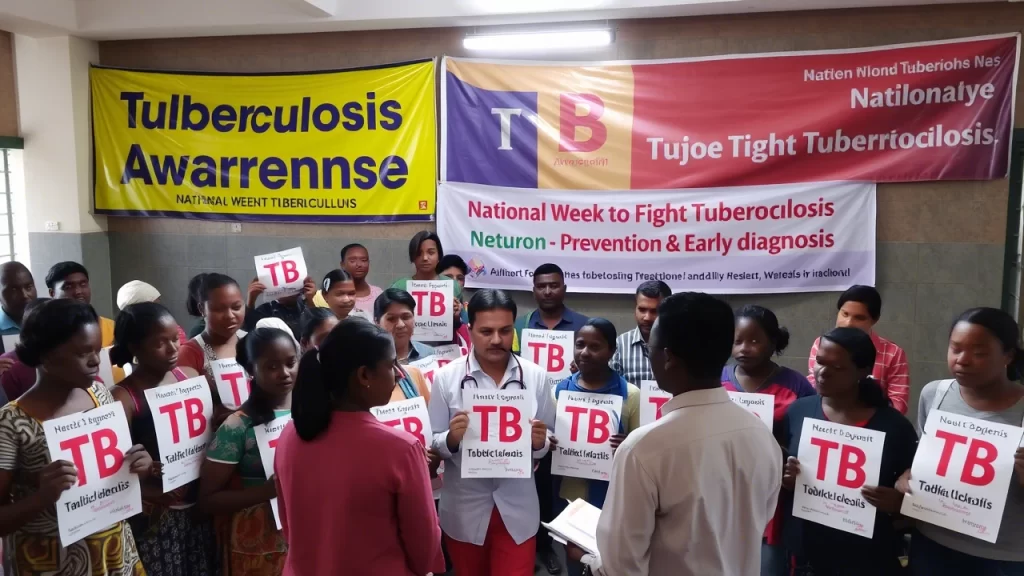Discover how Tuberculosis Awareness saves lives. Learn causes, symptoms, prevention, and treatment during National TB Fight Week.
Over 10 million people worldwide suffer from tuberculosis, a disease that silently endangers lives while often being misunderstood. In the United States and beyond, the call for Tuberculosis Awareness has never been more critical. We understand how overwhelming it can feel to navigate the complexities of tuberculosis, but you’re not alone. This guide will empower you with the knowledge and tools to recognize, prevent, and treat TB effectively. Let’s take the first step together toward a healthier, happier future!

Understanding Tuberculosis: Causes and Risks
Tuberculosis (TB) is caused by the bacterium Mycobacterium tuberculosis, which primarily affects the lungs but can spread to other parts of the body. Key risk factors include:
- Close Contact: Spending time with someone who has active TB increases your risk.
- Weakened Immune System: Conditions like HIV/AIDS, malnutrition, or chronic diseases can compromise immunity.
- Living Conditions: Overcrowded environments and poor ventilation facilitate the spread of TB.
- Substance Abuse: Smoking and excessive alcohol consumption can weaken lung defenses.
Understanding these causes and risks is a fundamental part of Tuberculosis Awareness. Being informed helps you take proactive measures to protect yourself and those around you.
Early Symptoms You Shouldn’t Ignore
Early detection is crucial in the fight against TB. Recognizing the symptoms can lead to timely intervention and prevent the disease from progressing. Common early signs include:
- Persistent Cough: Lasting more than three weeks and sometimes producing blood.
- Fatigue and Weakness: Ongoing tiredness that interferes with daily activities.
- Fever and Night Sweats: Unexplained fevers and profuse sweating during sleep.
- Weight Loss: Unintentional and rapid weight loss.
- Chest Pain: Discomfort or pain when breathing or coughing.
If you experience any of these symptoms, it’s important to consult a healthcare professional promptly. Early symptom recognition is key to Tuberculosis Awareness and can dramatically improve treatment outcomes.
How Tuberculosis Spreads and Ways to Prevent It
Tuberculosis spreads primarily through the air when an infected person coughs, sneezes, or even speaks. Preventing transmission requires a multi-faceted approach:
- Ventilation: Ensure living and workspaces are well-ventilated.
- Respiratory Hygiene: Cover your mouth and nose when coughing or sneezing; use tissues or your elbow.
- Vaccination: The Bacillus Calmette-Guérin (BCG) vaccine can provide some protection, particularly in high-risk areas.
- Screening and Isolation: Early identification of active TB cases and isolation during treatment are critical.
Other preventive measures include maintaining a healthy lifestyle and following public health guidelines. This proactive stance is vital for Tuberculosis Awareness and community health.
Importance of Early Diagnosis and Treatment
Early diagnosis is essential to controlling TB. Modern screening techniques, such as the TB skin test and interferon-gamma release assays (IGRAs), help detect the disease before it becomes severe. Here are some reasons why early diagnosis matters:
- Prevents Spread: Identifying TB early helps contain its transmission to others.
- Improves Outcomes: Early treatment can prevent complications and reduce mortality.
- Shortens Treatment Duration: When caught early, patients may require shorter, less intensive therapy.
Once diagnosed, a strict treatment regimen—often involving multiple antibiotics over several months—is crucial. Adhering to the prescribed course not only cures the patient but also prevents drug-resistant TB from developing. Early diagnosis and timely treatment are pillars of Tuberculosis Awareness that can save countless lives.
Community Mobilization in the Fight Against TB
Community involvement is a powerful tool in the battle against tuberculosis. Local organizations, healthcare providers, and community leaders play a vital role in spreading Tuberculosis Awareness. Here’s how communities can mobilize:
- Educational Campaigns: Hold workshops and seminars to educate the public on TB prevention and treatment.
- Free Screening Programs: Organize community-based screening events to identify cases early.
- Support Networks: Create support groups for patients and families affected by TB.
- Advocacy: Work with policymakers to secure funding and resources for TB research and treatment.
By uniting as a community, we foster an environment where individuals feel empowered to take action and support one another in the fight against tuberculosis.
Global Efforts to Eradicate Tuberculosis
Globally, significant efforts are underway to eradicate TB. International organizations, governments, and non-profits are working together to reduce the disease’s impact. Some key global initiatives include:
- World Health Organization (WHO) Programs: Coordinated efforts to improve TB diagnosis, treatment, and prevention worldwide.
- Global Fund to Fight AIDS, Tuberculosis and Malaria: Provides funding to high-burden countries to combat TB.
- Research and Development: Ongoing studies to develop better vaccines, medications, and diagnostic tools.
- Public-Private Partnerships: Collaborative efforts between governments and private sectors to enhance healthcare delivery.
These global efforts demonstrate that through combined action and Tuberculosis Awareness, we can move closer to a future where TB is no longer a threat.
FAQs About Tuberculosis Awareness
Q: What are the main causes of tuberculosis?
A: TB is caused by the bacterium Mycobacterium tuberculosis, and risk factors include close contact with infected individuals, weakened immunity, and living in crowded conditions.
Q: How can I prevent tuberculosis?
A: Prevent TB by practicing good respiratory hygiene, ensuring proper ventilation, getting vaccinated (where applicable), and participating in regular screenings.
Q: When should I seek treatment for TB?
A: If you experience persistent symptoms such as a prolonged cough, fever, or unexplained weight loss, consult a healthcare professional immediately.
Q: How important is community support in fighting TB?
A: Community mobilization is essential. Sharing knowledge, organizing screenings, and supporting affected individuals can significantly reduce TB’s spread.

Conclusion
Every step you take toward enhancing Tuberculosis Awareness is a victory worth celebrating. Empower yourself by understanding the risks, recognizing early symptoms, and actively engaging in preventive measures. Whether it’s through early screening, community mobilization, or global initiatives, you have the power to create lasting change.
Share this guide with someone who might benefit from it, or reach out to a trusted expert for personalized advice. Together, we can build a healthier tomorrow. Remember, if you’re struggling with tuberculosis, help is always available. You deserve support and care—start today by taking that first step toward a healthier future!


Pingback: Tuberculosis (TB): WHO Urges Action to Restore TB Services - stay healthy today